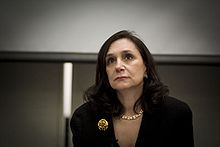Sherry Turkle (Cultural Analyst)
 Sherry Turkle is a Professor of the Social Studies of Science and Technology at the Massachusetts Institute of Technology.
Sherry Turkle is a Professor of the Social Studies of Science and Technology at the Massachusetts Institute of Technology.
Having obtained her undergraduate degree of BA of Social Studies and later her Ph.D. in Sociology and Personality Psychology at Harvard University, she now focuses her research on psychoanalysis and human-technology interaction.
She has written several books focusing on the psychology of human relationships with technology, especially in the realm of computer technology and computer addiction. Her most recent book, Alone Together, explores the dark side of the digital age.
In The Second Self, originally published in 1984, Turkle writes about how computers are not tools as much as they are a part of our social and psychological lives.
“‘Technology,’ she writes, ‘catalyzes changes not only in what we do but in how we think.’”
She goes on using Jean Piaget's psychology discourse to discuss how children learn about computers and how this affects their minds. The Second Self was received well by critics and was praised for being “a very thorough and ambitious study.”
In Life on the Screen, Turkle discusses how emerging technology, specifically computers, affect the way we think and see ourselves as humans. She presents to us the different ways in which computers effect us, and how it has lead us to the now prevalent use of "cyberspace."
Turkle suggests that assuming different personal identities in a MUD (i.e. computer fantasy game) may be therapeutic. She also considers the problems that arise when using MUDs.
Turkle discusses what she calls women's "non-linear" approach to the technology, calling it "soft mastery" and bricolage" (as opposed to the "hard mastery" of linear, abstract thinking and computer programming). She discusses problems that arise when children pose as adults online.
Turkle also explores the psychological and societal impact of such "relational artifacts" as sociable robots, and how these and other technologies are changing attitudes about human life and living things generally. One result may be a devaluation of authentic experience in a relationship.
Turkle was formerly married to Seymour Papert, and together they wrote the influential paper "Epistemological Pluralism and the Revaluation of the Concrete."
Professor Turkle has written numerous articles on psychoanalysis and culture and on the "subjective side" of people's relationships with technology, especially computers. She is engaged in active study of robots, digital pets, and simulated creatures, particularly those designed for children and the elderly as well as in a study of mobile cellular technologies.
Profiles of Professor Turkle have appeared in such publications as The New York Times, Scientific American, and Wired Magazine. She is a featured media commentator on the effects of technology for CNN, NBC, ABC, and NPR, including appearances on such programs as Nightline and 20/20.
Related Articles
- Online Resources To Help Empower Girls
- Sarah Parcak (Space Archaeologist)
- Susan Cain (Author)
- Rebecca Goldstein (Novelist / Philosopher)
- Janelle Monáe (Entertainer / Songwriter)
- Ainissa Ramirez (Scientist)
- Regina Dugan (Strategist / Inventor)
- Julie Burstein (Writer / Radio Producer)
- Karen Bass (Natural History Filmmaker)
- Sharon Beals (Photographer)
- 17 Women Rocked Stage @TED2012
- AAA Alphabetical TED Women Talks List